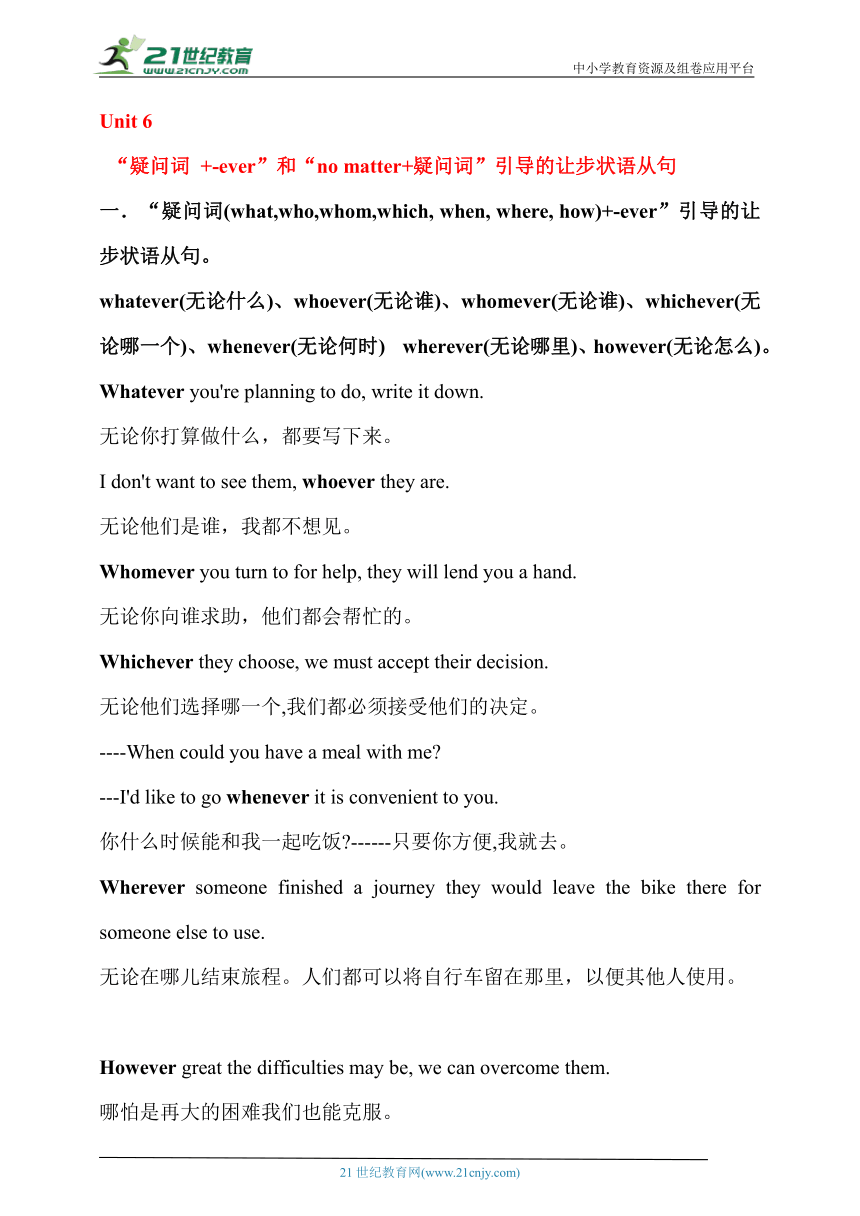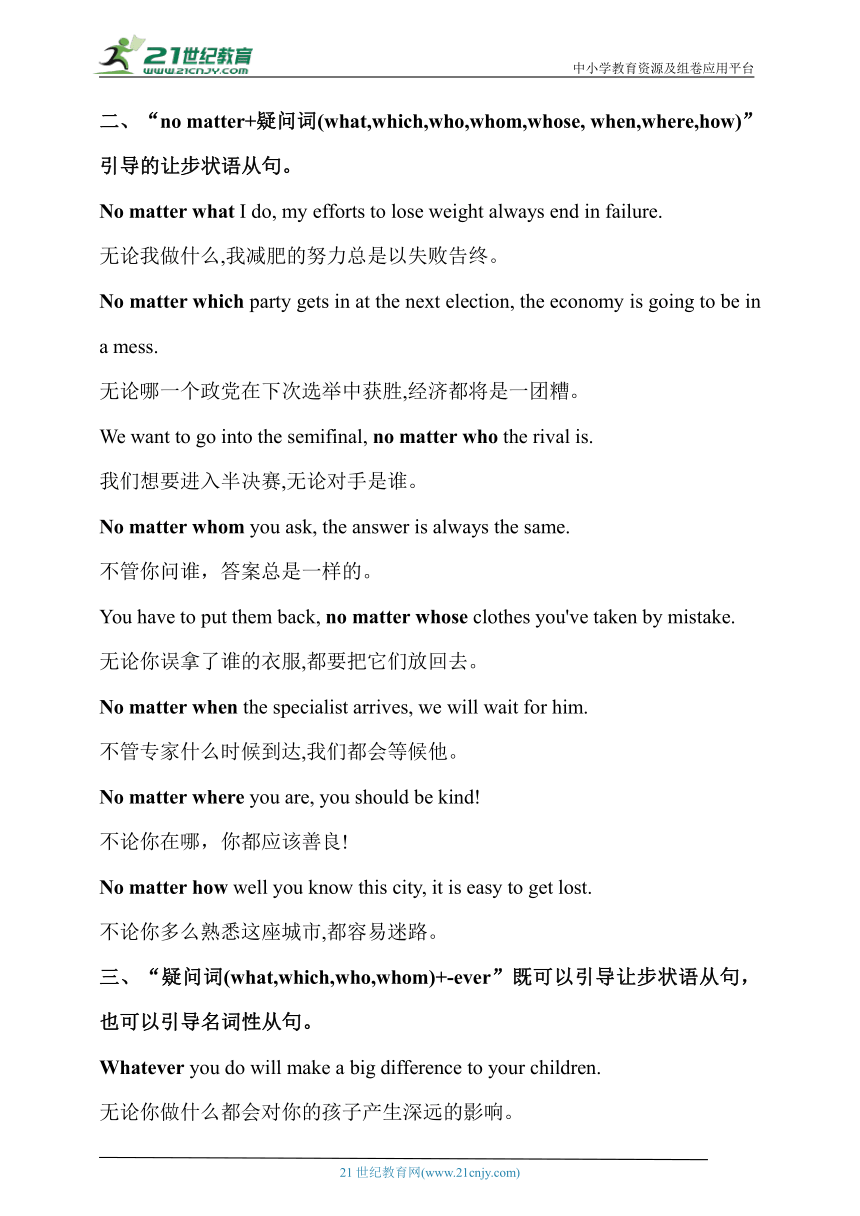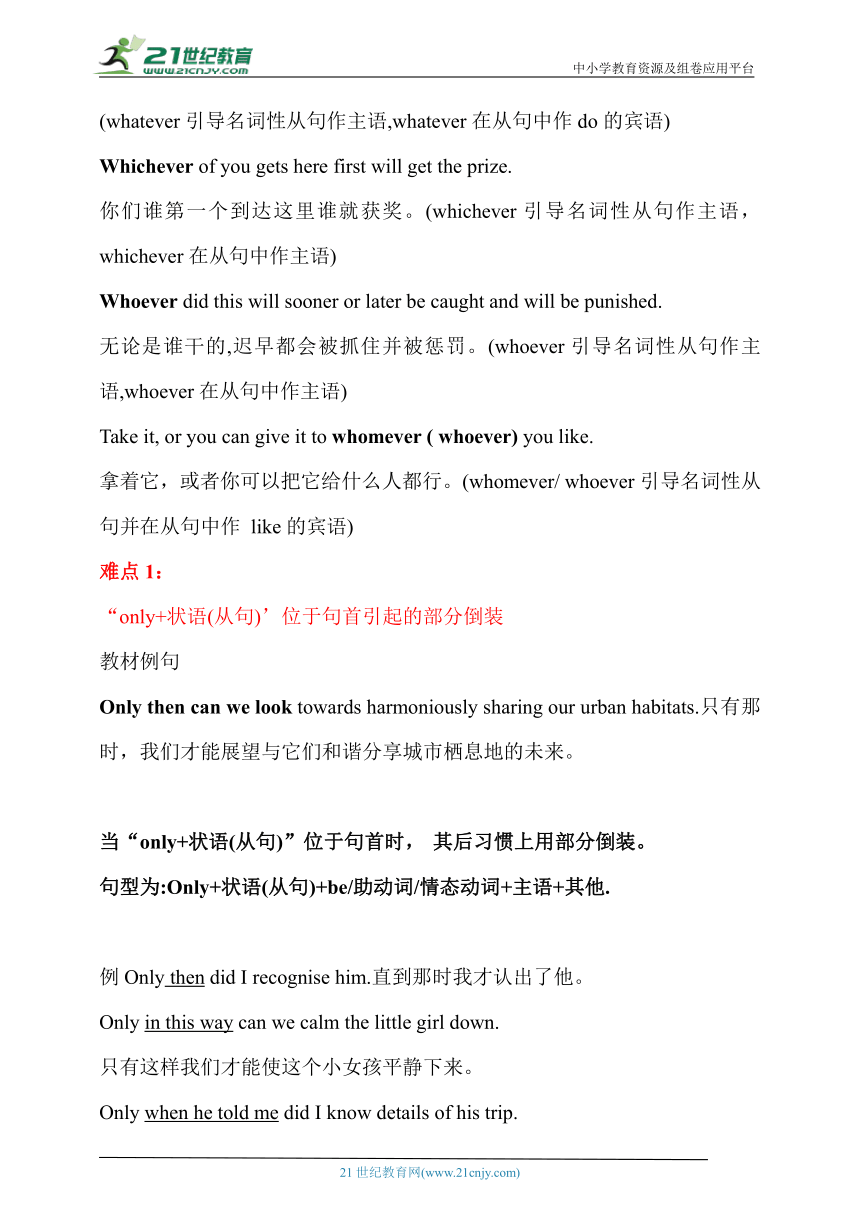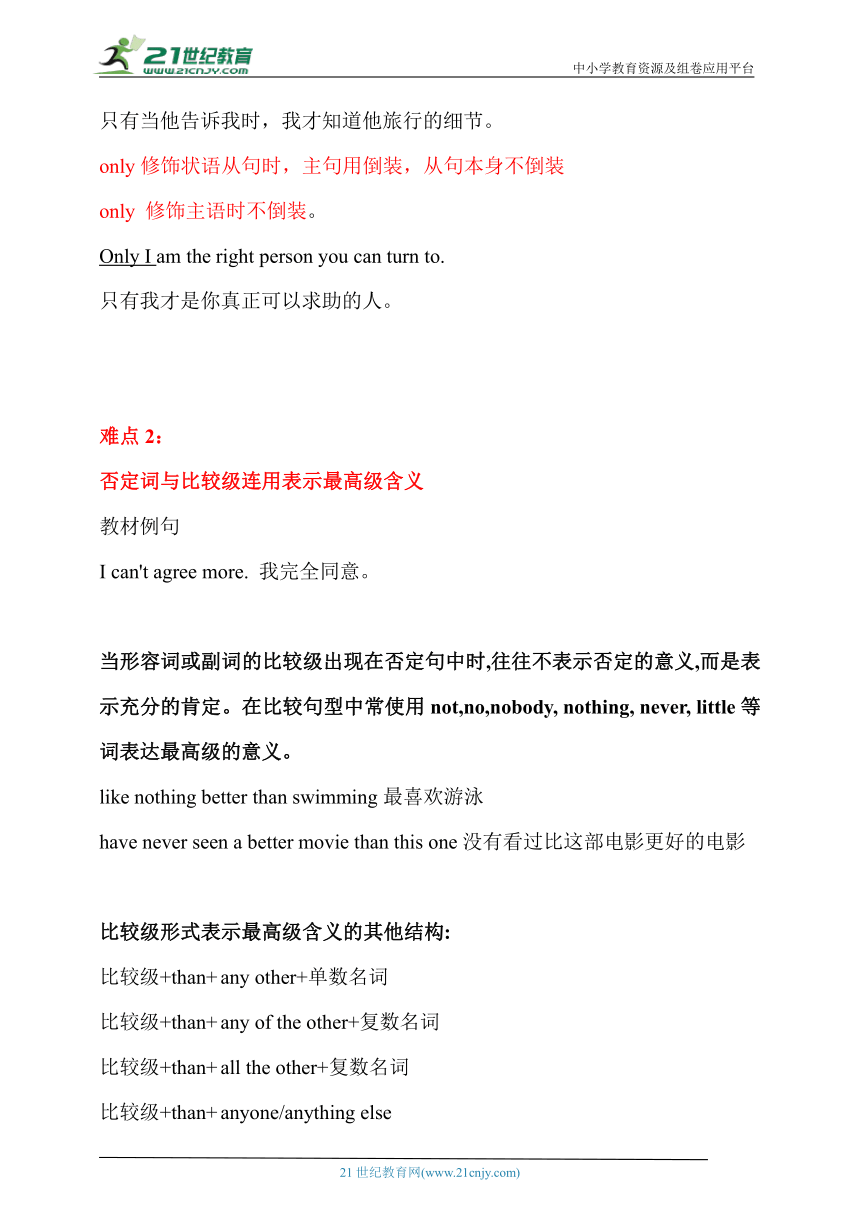(2019外研版)选修二unit 6 survival(精讲)
文档属性
| 名称 | (2019外研版)选修二unit 6 survival(精讲) |  | |
| 格式 | doc | ||
| 文件大小 | 279.8KB | ||
| 资源类型 | 试卷 | ||
| 版本资源 | 外研版(2019) | ||
| 科目 | 英语 | ||
| 更新时间 | 2024-05-06 18:57:51 | ||
图片预览





文档简介
中小学教育资源及组卷应用平台
Unit 6
“疑问词 +-ever”和“no matter+疑问词”引导的让步状语从句
一.“疑问词(what,who,whom,which, when, where, how)+-ever”引导的让步状语从句。
whatever(无论什么)、whoever(无论谁)、whomever(无论谁)、whichever(无论哪一个)、whenever(无论何时) wherever(无论哪里)、however(无论怎么)。
Whatever you're planning to do, write it down.
无论你打算做什么,都要写下来。
I don't want to see them, whoever they are.
无论他们是谁,我都不想见。
Whomever you turn to for help, they will lend you a hand.
无论你向谁求助,他们都会帮忙的。
Whichever they choose, we must accept their decision.
无论他们选择哪一个,我们都必须接受他们的决定。
----When could you have a meal with me
---I'd like to go whenever it is convenient to you.
你什么时候能和我一起吃饭 ------只要你方便,我就去。
Wherever someone finished a journey they would leave the bike there for someone else to use.
无论在哪儿结束旅程。人们都可以将自行车留在那里,以便其他人使用。
However great the difficulties may be, we can overcome them.
哪怕是再大的困难我们也能克服。
二、“no matter+疑问词(what,which,who,whom,whose, when,where,how)”引导的让步状语从句。
No matter what I do, my efforts to lose weight always end in failure.
无论我做什么,我减肥的努力总是以失败告终。
No matter which party gets in at the next election, the economy is going to be in a mess.
无论哪一个政党在下次选举中获胜,经济都将是一团糟。
We want to go into the semifinal, no matter who the rival is.
我们想要进入半决赛,无论对手是谁。
No matter whom you ask, the answer is always the same.
不管你问谁,答案总是一样的。
You have to put them back, no matter whose clothes you've taken by mistake.
无论你误拿了谁的衣服,都要把它们放回去。
No matter when the specialist arrives, we will wait for him.
不管专家什么时候到达,我们都会等候他。
No matter where you are, you should be kind!
不论你在哪,你都应该善良!
No matter how well you know this city, it is easy to get lost.
不论你多么熟悉这座城市,都容易迷路。
三、“疑问词(what,which,who,whom)+-ever”既可以引导让步状语从句,也可以引导名词性从句。
Whatever you do will make a big difference to your children.
无论你做什么都会对你的孩子产生深远的影响。
(whatever引导名词性从句作主语,whatever在从句中作do的宾语)
Whichever of you gets here first will get the prize.
你们谁第一个到达这里谁就获奖。(whichever引导名词性从句作主语,whichever在从句中作主语)
Whoever did this will sooner or later be caught and will be punished.
无论是谁干的,迟早都会被抓住并被惩罚。(whoever引导名词性从句作主语,whoever在从句中作主语)
Take it, or you can give it to whomever ( whoever) you like.
拿着它,或者你可以把它给什么人都行。(whomever/ whoever引导名词性从句并在从句中作 like的宾语)
难点1:
“only+状语(从句)’位于句首引起的部分倒装
教材例句
Only then can we look towards harmoniously sharing our urban habitats.只有那时,我们才能展望与它们和谐分享城市栖息地的未来。
当“only+状语(从句)”位于句首时, 其后习惯上用部分倒装。
句型为:Only+状语(从句)+be/助动词/情态动词+主语+其他.
例Only then did I recognise him.直到那时我才认出了他。
Only in this way can we calm the little girl down.
只有这样我们才能使这个小女孩平静下来。
Only when he told me did I know details of his trip.
只有当他告诉我时,我才知道他旅行的细节。
only修饰状语从句时,主句用倒装,从句本身不倒装
only 修饰主语时不倒装。
Only I am the right person you can turn to.
只有我才是你真正可以求助的人。
难点2:
否定词与比较级连用表示最高级含义
教材例句
I can't agree more. 我完全同意。
当形容词或副词的比较级出现在否定句中时,往往不表示否定的意义,而是表示充分的肯定。在比较句型中常使用not,no,nobody, nothing, never, little等词表达最高级的意义。
like nothing better than swimming最喜欢游泳
have never seen a better movie than this one没有看过比这部电影更好的电影
比较级形式表示最高级含义的其他结构:
比较级+than+ any other+单数名词
比较级+than+ any of the other+复数名词
比较级+than+ all the other+复数名词
比较级+than+ anyone/anything else
He studies harder than
any other student in his class.
any of the other students in his class.
all the other students in his class. anyone else in his class.
他学习比他班上其他任何学生都努力。
难点3:
What if... 如果……将会怎么样
教材例句
But what if.../ what about... 但是如果……将会怎么样/……怎么样
常用句式:
How come... ……怎么会这样 /…怎么搞的
How/What about. ……怎么样
What for 为什么(目的) 为何(理由)
So what 那又怎样
Why not do sth. 为什么不做某事
Why me 为什么是我
Why not 为什么不
Who cares (无礼地表示)谁在乎呢 谁管呢
难点4
不定式短语作表语
教材例句
One option is to explore other planets to see if we could live on them.
一种选择是探索其他星球,看看我们能否在上面生活。
不定式/动名词短语作表语
前者表示具体的动作,特别是表示将来的动作。
The only thing for you to do now is( to) apologise.
你现在唯一要做的事就是道歉。
主语部分有实义动词do的各种形式时,作表语的不定式可以省略to
后者表示经常性、一般性的行为。
Our work is ending up the sufferings of the homeless dogs.
我们的工作是结束流浪狗的苦难。
难点5
have/has been doing
一直在做……(现在完成进行时)
教材例句
Since the1960s,we have been sending unmanned spacecraft to Mars.
自20 世纪60年代以来,我们一直在向火星发射无人飞船。
构成:have/has been doing
意义:表示动作从某一时间开始,一直持续到现在,或者刚刚终止,或者可能仍然要继续下去。
现在完成时与现在完成进行时的区别:
现在完成时表示事情发生在过去,并一直持续到现在,且过去发生的动作对现在有一定的影响。现在完成时强调动作、行为的结果、影响。
现在完成进行时表示从过去开始一直持续到现在的动作,强调这个动作可能会继续下去。它只强调动作、行为本身未完成。
表示状态的动词不能用于现在完成进行时。
难点6
There is no doubt that...毫无疑问……
教材例句
There is no doubt that humankind is drawn towards Mars, with dreams of making it our second home.
毫无疑问,人类被火星所吸引,梦想着把它作为我 们的第二家园。
I have no doubt that...
There is no doubt that...
“毫无疑问……”,是一个固定句型, that引导同位语从句,解释说明doubt的具体内容。
There is some doubt whether...
I have some doubt whether…对是否……有些疑问。
I doubt whether/if... 我怀疑是否……
I don't doubt that... 我确信……
肯定句中:
doubt+(n.)+whether 引导的同位语从句(不用if)
doubt+(v.)+whether/if引导的宾语从句
否定句、疑问句中:
doubt+that 引导的同位语从句或宾语从句
难点7
while 引导让步状语从句
教材例句
While the Moon can be reached within days, it would take months to reach Mars, travelling through dangerous solar radiation.
到达月球只需要几天的时间,而到达火星却需要数月的时间,并且其间要经历危险的太阳辐射。
while在此处引导让步状语从句,意为“虽然”,多位于句首。
while 的其他用法:
(1)while作并列连词,意为“而,然而”,表对比。
(2)while引导时间状语从句,意为“当……时候”。从句的谓语动词为延续性动词,从句的动作与主句的动作同时发生。
(3)while引导让步状语从句和时间状语从句时,如果主从句主语一致且从句中含有be动词,那么从句主语和be动词均可省略。
I feel asleep while (I was) doing my homework.
我做着做着功课就睡着了。
本单元词组:
in one’s way 挡住某人的去路
under construction 在建设中
crash into 撞到…上
cope with 应付
wipe out 彻底摧毁;消灭
have no choice but to do 别无选择只能做…
fit in with 适应;符合
amount to 总计为
bring…under control 使…处于控制之下
consist of 由…构成;由…组成
out of reach 遥不可及
get a taste for 品尝;体验
heat wave 酷热期;热浪期
get rid of 摆脱;除去
in the meantime 在此期间;与此同时
crash into 撞到…上
make efforts to do 努力做
be caught in 陷入
lose contact with 与…失去联系
fight against
respond to对... 作出反应
be combined with与... 结合
break out爆发
stop…from阻止……去做
apart from除…外;除去
be diagnosed with被诊断为
21世纪教育网 www.21cnjy.com 精品试卷·第 2 页 (共 2 页)
21世纪教育网(www.21cnjy.com)
Unit 6
“疑问词 +-ever”和“no matter+疑问词”引导的让步状语从句
一.“疑问词(what,who,whom,which, when, where, how)+-ever”引导的让步状语从句。
whatever(无论什么)、whoever(无论谁)、whomever(无论谁)、whichever(无论哪一个)、whenever(无论何时) wherever(无论哪里)、however(无论怎么)。
Whatever you're planning to do, write it down.
无论你打算做什么,都要写下来。
I don't want to see them, whoever they are.
无论他们是谁,我都不想见。
Whomever you turn to for help, they will lend you a hand.
无论你向谁求助,他们都会帮忙的。
Whichever they choose, we must accept their decision.
无论他们选择哪一个,我们都必须接受他们的决定。
----When could you have a meal with me
---I'd like to go whenever it is convenient to you.
你什么时候能和我一起吃饭 ------只要你方便,我就去。
Wherever someone finished a journey they would leave the bike there for someone else to use.
无论在哪儿结束旅程。人们都可以将自行车留在那里,以便其他人使用。
However great the difficulties may be, we can overcome them.
哪怕是再大的困难我们也能克服。
二、“no matter+疑问词(what,which,who,whom,whose, when,where,how)”引导的让步状语从句。
No matter what I do, my efforts to lose weight always end in failure.
无论我做什么,我减肥的努力总是以失败告终。
No matter which party gets in at the next election, the economy is going to be in a mess.
无论哪一个政党在下次选举中获胜,经济都将是一团糟。
We want to go into the semifinal, no matter who the rival is.
我们想要进入半决赛,无论对手是谁。
No matter whom you ask, the answer is always the same.
不管你问谁,答案总是一样的。
You have to put them back, no matter whose clothes you've taken by mistake.
无论你误拿了谁的衣服,都要把它们放回去。
No matter when the specialist arrives, we will wait for him.
不管专家什么时候到达,我们都会等候他。
No matter where you are, you should be kind!
不论你在哪,你都应该善良!
No matter how well you know this city, it is easy to get lost.
不论你多么熟悉这座城市,都容易迷路。
三、“疑问词(what,which,who,whom)+-ever”既可以引导让步状语从句,也可以引导名词性从句。
Whatever you do will make a big difference to your children.
无论你做什么都会对你的孩子产生深远的影响。
(whatever引导名词性从句作主语,whatever在从句中作do的宾语)
Whichever of you gets here first will get the prize.
你们谁第一个到达这里谁就获奖。(whichever引导名词性从句作主语,whichever在从句中作主语)
Whoever did this will sooner or later be caught and will be punished.
无论是谁干的,迟早都会被抓住并被惩罚。(whoever引导名词性从句作主语,whoever在从句中作主语)
Take it, or you can give it to whomever ( whoever) you like.
拿着它,或者你可以把它给什么人都行。(whomever/ whoever引导名词性从句并在从句中作 like的宾语)
难点1:
“only+状语(从句)’位于句首引起的部分倒装
教材例句
Only then can we look towards harmoniously sharing our urban habitats.只有那时,我们才能展望与它们和谐分享城市栖息地的未来。
当“only+状语(从句)”位于句首时, 其后习惯上用部分倒装。
句型为:Only+状语(从句)+be/助动词/情态动词+主语+其他.
例Only then did I recognise him.直到那时我才认出了他。
Only in this way can we calm the little girl down.
只有这样我们才能使这个小女孩平静下来。
Only when he told me did I know details of his trip.
只有当他告诉我时,我才知道他旅行的细节。
only修饰状语从句时,主句用倒装,从句本身不倒装
only 修饰主语时不倒装。
Only I am the right person you can turn to.
只有我才是你真正可以求助的人。
难点2:
否定词与比较级连用表示最高级含义
教材例句
I can't agree more. 我完全同意。
当形容词或副词的比较级出现在否定句中时,往往不表示否定的意义,而是表示充分的肯定。在比较句型中常使用not,no,nobody, nothing, never, little等词表达最高级的意义。
like nothing better than swimming最喜欢游泳
have never seen a better movie than this one没有看过比这部电影更好的电影
比较级形式表示最高级含义的其他结构:
比较级+than+ any other+单数名词
比较级+than+ any of the other+复数名词
比较级+than+ all the other+复数名词
比较级+than+ anyone/anything else
He studies harder than
any other student in his class.
any of the other students in his class.
all the other students in his class. anyone else in his class.
他学习比他班上其他任何学生都努力。
难点3:
What if... 如果……将会怎么样
教材例句
But what if.../ what about... 但是如果……将会怎么样/……怎么样
常用句式:
How come... ……怎么会这样 /…怎么搞的
How/What about. ……怎么样
What for 为什么(目的) 为何(理由)
So what 那又怎样
Why not do sth. 为什么不做某事
Why me 为什么是我
Why not 为什么不
Who cares (无礼地表示)谁在乎呢 谁管呢
难点4
不定式短语作表语
教材例句
One option is to explore other planets to see if we could live on them.
一种选择是探索其他星球,看看我们能否在上面生活。
不定式/动名词短语作表语
前者表示具体的动作,特别是表示将来的动作。
The only thing for you to do now is( to) apologise.
你现在唯一要做的事就是道歉。
主语部分有实义动词do的各种形式时,作表语的不定式可以省略to
后者表示经常性、一般性的行为。
Our work is ending up the sufferings of the homeless dogs.
我们的工作是结束流浪狗的苦难。
难点5
have/has been doing
一直在做……(现在完成进行时)
教材例句
Since the1960s,we have been sending unmanned spacecraft to Mars.
自20 世纪60年代以来,我们一直在向火星发射无人飞船。
构成:have/has been doing
意义:表示动作从某一时间开始,一直持续到现在,或者刚刚终止,或者可能仍然要继续下去。
现在完成时与现在完成进行时的区别:
现在完成时表示事情发生在过去,并一直持续到现在,且过去发生的动作对现在有一定的影响。现在完成时强调动作、行为的结果、影响。
现在完成进行时表示从过去开始一直持续到现在的动作,强调这个动作可能会继续下去。它只强调动作、行为本身未完成。
表示状态的动词不能用于现在完成进行时。
难点6
There is no doubt that...毫无疑问……
教材例句
There is no doubt that humankind is drawn towards Mars, with dreams of making it our second home.
毫无疑问,人类被火星所吸引,梦想着把它作为我 们的第二家园。
I have no doubt that...
There is no doubt that...
“毫无疑问……”,是一个固定句型, that引导同位语从句,解释说明doubt的具体内容。
There is some doubt whether...
I have some doubt whether…对是否……有些疑问。
I doubt whether/if... 我怀疑是否……
I don't doubt that... 我确信……
肯定句中:
doubt+(n.)+whether 引导的同位语从句(不用if)
doubt+(v.)+whether/if引导的宾语从句
否定句、疑问句中:
doubt+that 引导的同位语从句或宾语从句
难点7
while 引导让步状语从句
教材例句
While the Moon can be reached within days, it would take months to reach Mars, travelling through dangerous solar radiation.
到达月球只需要几天的时间,而到达火星却需要数月的时间,并且其间要经历危险的太阳辐射。
while在此处引导让步状语从句,意为“虽然”,多位于句首。
while 的其他用法:
(1)while作并列连词,意为“而,然而”,表对比。
(2)while引导时间状语从句,意为“当……时候”。从句的谓语动词为延续性动词,从句的动作与主句的动作同时发生。
(3)while引导让步状语从句和时间状语从句时,如果主从句主语一致且从句中含有be动词,那么从句主语和be动词均可省略。
I feel asleep while (I was) doing my homework.
我做着做着功课就睡着了。
本单元词组:
in one’s way 挡住某人的去路
under construction 在建设中
crash into 撞到…上
cope with 应付
wipe out 彻底摧毁;消灭
have no choice but to do 别无选择只能做…
fit in with 适应;符合
amount to 总计为
bring…under control 使…处于控制之下
consist of 由…构成;由…组成
out of reach 遥不可及
get a taste for 品尝;体验
heat wave 酷热期;热浪期
get rid of 摆脱;除去
in the meantime 在此期间;与此同时
crash into 撞到…上
make efforts to do 努力做
be caught in 陷入
lose contact with 与…失去联系
fight against
respond to对... 作出反应
be combined with与... 结合
break out爆发
stop…from阻止……去做
apart from除…外;除去
be diagnosed with被诊断为
21世纪教育网 www.21cnjy.com 精品试卷·第 2 页 (共 2 页)
21世纪教育网(www.21cnjy.com)
